Peter MALONE
Saturday, 18 September 2021 19:33
Day of the Triffids, The
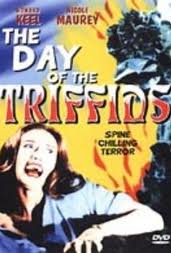
THE DAY OF THE TRIFFIDS
UK, 1962, 94 Minutes. Colour.
Howard Keel, Nicole Maurey, Janette Scott, Kieron Moore, Mervyn Johns.
Directed by Steve Sekely.
The Day of the Triffids is an adaptation of John Wyndham's famous novel. Enthusiasts for Wyndham's work were very disappointed in this film version. It was made in colour and in wide screen. The screenplay and adaptation was by Phillip Yordan, a very competent writer of many screenplays. However, the direction is uneven, the product an international adventure with a strange cast led by Howard Keel. There are many interesting special effects and trick camera work. The essence of Wyndham's science fiction is there. However, it is definitely only a version of the original. It was made in the early 60s, just before the enthusiasms for science fiction was to move into big budget films.
1. How good was this as science-fiction, how enjoyable?
2. Why do audiences enjoy science-fiction: futuristic, comment on society, comment in pessimistic terms on science and its effects on the world etc.? what insight into contemporary living is given by science-fiction?
3. The film's use of colour, widescreen, European locations, musical commentary?
4. Comment on the horror emphasis of the film in contrast with John Wyndham's comment on civilizations? Did the film incorporate the author's comments?
5. The film's focus on mason? The audience seeing the crisis through his eyes? How sympathetic and interesting a character was he? How heroic a figure for this film?
6. Did the film create a plausible atmosphere for the science-fiction happenings? The plausibility at the beginning, the change when the crisis occurred?
7. The impact of the meteorites and their visualization? The effect on the earth? How credible?
8. The visualizing of the Triffids: as filmed, creating fear, destructive, unexplained evil, human powerlessness in the face of them?
9. The importance of the various European locations: beginning in England, London, and the railway station etc., Paris and the same crisis, the house in France, Spain and the attack, the submarine setting, the Goodwins and their experimentation? Did this give an overall picture of the world under attack by the Triffids?
10. The importance of the 'chase' structure of the film? Masen escaping from a pursuing evil? The importance of Susan being with him, human interest and sympathy? Christine? The Spanish couple and the pregnant wife? Audience sympathy for these characters as victims? The contrast with the menace of the Triffids?
11. The contrast of the sequences with the Goodwins? The atmosphere of suspense and excitement? The need for them to find a remedy for the Triffids? The importance of their discovery?
12. How visually interesting and effective were such sequences as the attack on the house, the electric attack on the Triffids, the final water remedy?
13. The film's atmosphere of relief when the danger was warded off?
14. How good a standard of science-fiction was this film?
Published in Movie Reviews
Published in
Movie Reviews
Tagged under
Saturday, 18 September 2021 19:33
Day of the Owl, The

THE DAY OF THE OWL
Italy, 1968, 113 minutes, Colour.
Franco Nero, Lee J. Cobb, Claudia Cardinale, Nehemiah Persoff, Serge Reggiani.
Directed by Damiano Damiani.
The Day of the Owl is a film critical of the Mafia made at the same time as Elio Petri's We Still Kill The Old Way, but preceding the Godfather films and the trend in Mafia exposes. American comparisons would include The Brotherhood, Crazy Joe, Honour Thy Father. The film is written and directed by Damiano Damiani, a director of a wide range of films, some exploitive, others very melodramatic, for example The Tempter starring Glenda Jackson, Venus in Furs starring Laura Antonelli. This film as a very good cast, an excellent role for Claudia Cardinale. Franco Nero has an interesting performance as the upright but beaten policeman. A dubbed American cast includes Lee J. Cobb and Nehemiah Persoff. The atmosphere of Sicily is vividly re-created and the hold of the Mafia on A town presented critically but pessimistically.
1. Interesting social and personal drama? Audience interest in the Mafia and its hold? For Italian audiences? Universal audiences? Entertainment, critique?
2. Colour photography, atmosphere of Sicily? musical score? An authentic atmosphere for the drama?
3. The film as a character study: the presentation of the inspector, his background, ability, manner of investigation, control of his men, the team of police, dedication, aim at breaking the Mafia hold? His orthodox and unorthodox devices? His despising the unorthodox methods? Antagonism towards the Mafia chief? Arresting the men, interrogating them, letting them go, trying to trap the guilty? The discussions with Rosa? His being shut out by the local inhabitants, especially Rosa? His growing desperation? The final discovery of the body and his disappointment? His being removed from the case? The Mafia chief's tribute to him - that he was a man of principle and courage? The pessimism of his final defeat and Mafia triumph?
4. Claudia Cardinale as Rosa - the Italian wife and mother? The first introduction to her and the disappearance of her husband, her child? Her continued concern about her husband and hope for his reappearance? The false hopes? The lying messenger on the motor bike? The discussions with the inspector - her wanting to help but her excluding him because of local pressures? The men flirting with her? The flirtation with her in her own home? The attempts to blacken her name? Her sorrow, fear? Her being called before the Mafia council and their intimidation? Her final unwillingness to help the inspector? Her future? A rounded portrait of an Italian woman?
5. The Mafia chief and his hold over the town? Lee J. Cobb in the role? Type, presuppositions, henchmen? Money interests, roads and buildings? Murders? Arrest and interrogation? Political intrigue and political connections? His finally being released? The tribute of the people in the city? His attitude towards the inspector?
6. The Mafia chief's henchmen and entourage? Their jobs, hit-men, bosses with the work force? Manipulations, murders and cover-ups? Arrests? Interrogations? The mutual support? The henchman proposing to Rosa, his being arrested, interrogated, released? The Mafia winning?
7. The presentation of Italian codes of behaviour and loyalty? The values of loyalty overcoming those of truth? The initial murder? The cover-up? The removal of witnesses? The blackening of names?
8. The picture of the police, their methods of investigation, interrogation? Difficulties? Clashing with Mafia codes?
9. The style of the Sicilian city? ordinary life? Subservience to the Mafia chiefs? The hold of the Mafia in Italy - films like this contributing towards the exposure of the Mafia?
10. How well did the film work on the level of murder investigation, mystery, personal and social drama?
Published in Movie Reviews
Published in
Movie Reviews
Tagged under
Saturday, 18 September 2021 19:33
Day of the Locust, The
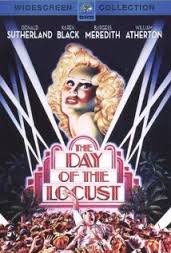
THE DAY OF THE LOCUST
US, 1974,143 minutes, Colour.
Donald Sutherland, Karen Black. Burgess Meredith, William Atherton, Geraldine Page, Jackie Earle Haley.
Directed by John Schlesinger.
Day of the Locust is Nathanael West's story of Hollywood in the '30s. It is hard- hitting; the reconstruction of the times and places is very effective; the acting is good, especially Donald Sutherland as the shy Homer; John Schlesinger is the director. Highlights are the details of filming, the accidents and especially the hysterical finale at the Cecil B. deMille premiere, the destructive plague of the title, symbolising the film's theme. It is very gripping in itself but over-strong for what precedes. An interesting film rather than an entertaining one.
1. The status of this film, the work of the director John Schlesinger, the status of the novel and its insight into Hollywood of the '30s?
2. How successful was the adaptation from the novel? The visionary aspects of the novel - Hollywood and its artificiality, the picture of America in the '30s, a destructive apocalyptic vision and cleansing? The locusts as plague? Ordinary people as locusts, the nature of their destruction? How well was this pictured, the culmination and the devices used for the picturing of the plague and the apocalypse?
3. The trend of the mid '70s to re-create Hollywood and aspects? The interest in Hollywood. nostalgia, wonder, disgust? The comparison of the '70s with the '20s and '30s of Hollywood? How much insight by these memories into the present?
4. Hollywood in the '30s as a place, the people there and their hopes, the opportunities, Los Angeles and the atmosphere of Southern California? The studios, the creativity. the assembly line for films? The atmosphere of the studios? The echoes of Nazism and fascism in Europe and the way these were indicated throughout the film e.g. by headlines? The importance of the popular songs of the time - Jeepers Creepers, Hot Voodoo etc.? Authentic flavour for these memories?
5. Todd as the centre of the film? How entering the film through him, experiencing the characters.. Hollywood. the plague? His return at the end and our identification with him in summing up our experience? An ordinary young man for the audience to identify with, lack of money, hopes, opportunities, infatuation with Faye. friendship with Homer, likes and dislikes, success and failure? Possibility that he would have been swept away with the plague? The ironies in his return to the San Bernardino Arms and seeing the cracked wall, the flower? What was the audience left with as it shared his final experience?
6. The San Bernardino mansions as a microcosm of this world? The landlady and her control, inquiries, way of acting? Abe and his being a dwarf, his attitudes towards life, people, sexuality, the insights into him during the cock-fight sequence, his behaviour afterwards? His drinking? The artificiality of these apartments? As home? Faye and Harry and living there? The return to these apartments after all that had happened in the outside world of Hollywood?
7. How well did the film portray Hollywood - its opportunities, Faye and her ambitions, her lining up for bit-parts, the glamour of her dressing up for these moments, the humour of the sequence of the harem and the going to see the film, her reaction to seeing herself, the stealing of the photo? The sequence of the ball? Todd and his continued work., drawings, imaginative and artistic sketchings? The production values of the film? The importance of the hill and the collapse of the hill with its destruction? The arguments afterwards about insurance - and the lack of human feeling? The build-up to sneak previews and their mystique, the searchlights, the crowds, the stars arriving., the frenzied tones of the commentators, the fans surging forward? How was this all linked to the significance of the title?
8. The mystique of Hollywood, its potential for creativity, its exploration of values. the entertainment industry? The world of money, big business and interconnections? The destructive potential of Hollywood - even in its creativity? That it needed a plague, that it produced a plague? The myths and the artifice of Hollywood e.g. the tour sequence?
9. How well did the film draw the character of Todd? His strengths and weaknesses, his fascination with Hollywood, the photos, his involvement with the various groups in Hollywood - Faye and the San Bernardino Arms people, Claude and the studios? His work with promotions? His devices for Claude and getting in well with him? The Waterloo drawings? The world of parties and his being involved? His being spoilt by his opportunities in Hollywood? His drinking? Such scenes as the haircut, the cock-fight? His relationship with Faye, Harry. Homer? What happened to him by this experience? Was he different at the end., better. worse?
10. Todd and Faye and his idealising of her. as in a vision? The quality of his love for her, stealing the photo.. the various outings e.g. buying the ice cream, the steaks? Barbeque? His devotion to Harry? Her warnings about herself? The things that they shared, the reaction to Harry's death. the funeral and Todd's behaviour with her at the funeral? Todd and his liking for Homer, his being irritated with Homer. jealousy? Their behaviour at the party? The discovery of Faye's infidelity? What regrets did Todd have at the end, that very little had been achieved in emotional and sexual relationship with her?
11. What was Faye symbolising? Her manner, type, age., glamour, belief in all the cliches of the fan magazines? Thinking she was better than she was? Her work. the film? Photos? Her discussions with the eating of the ice cream? The stories that she made up and their cliche nature but how much they meant to her? Her leading Todd on? Her love for her father yet her taunting him? Going to rescue him when he was ill at Homer's? Her friendship with Mary Dove and the work at the brothel? Her reaction to Harry's death and her anger? Her grief at the funeral and the encounter with Todd, with Mary? The barbeque sequence and all that it revealed of her sensuality, drinking, violence. Miguel and Earle? Her leading Earle on? Her moving in with Homer and the arrangement? The outing at the nightclub and her taunting him to drink? Her hold over Homer? The cock-fight and her behaviour, dancing with Abe., her infidelity with Miguel and her leaving? The image of the flighty butterfly of Hollywood?
12. The contrast with Homer - from the mid-west,, his moving west for his health, his awkward and ungainly manner, his shyness? Seeing him in his home, the contrast with the world of Hollywood, his reaction to Harry and being genteel with him, not knowing how to react? The flowers, the attentions to Faye? The meals? The importance of their going to the revivalist session and his involvement in it, carrying Harry to the healer, the reaction to what happened? His proposition for having Faye in the house? The happiness in his devotion to her and seeing only the good in her? The nightclub, his reaction to the drinking, to the female impersonator singing? His disgust at the party? His pain in discovering Faye in bed? Adore in the background, the Hollywood child? the possessive mother? The drawing together of these strands and his moving down the street, being oblivious of the sneak preview, his pain, sitting on the chair, Adore and his singing and taunting and the stone? How comprehensible was Homer's rage and his killing Adore? The subjective violence and the breaking out of his brutality? The ugliness of the mob turning on him and tearing him to pieces? Of what was he a symbol in terms of the Day of the Locust?
13. Harry as a personality, his dwelling on his past, the collage of his visits and their being done in music hall style, the humour of his tricks, his arguments, his re-doing his acts for various audiences, his crudity, his anti-Semitism? The importance of his listening to the preacher, his going to the revival meeting, his doing an act? The build-up to his death? The pathos of his death and the people's reaction to it? The funeral and the bitterness? The people watching and their running away to see the celebrities - the ironies of death in Hollywood?
14. The cowboys, their wag of living, their stunts, the barbeque and their drinking, dancing, the cock-fights, sexuality? The personality of Earle as a man of the west, the Hollywood cowboy, relationship with Faye? Attitude towards Todd? Miguel and his friendship, the whole background of the cock-fight?
15. Claude and the background of the Hollywood studios, his skill, interest in talent, friendship with Todd? The depraved and decadent aspects of Hollywood - going to Audrey's, the watching of the pornographic film? His involvement in the cover-up after the disaster on the film set? The ambiguities of the conversation when they were getting haircuts and this as a symbol of the group that was in and the deals done for cover-up? His relationship with his wife? Home?
16. The glimpse of the fashionable brothel, the clientele, the wealth, the external elegance, the pornographic films? Mary and her work there, friendship with Faye, Faye and her work there?
17. The build-up to the preview, the preparation of the audience with getting the various characters into the place - Todd and his wandering, Faye and her presence there, Homer? The long sequence with the flashing visuals, music, the drawings? The overtones of the '30s holocaust? The visual schools in this sequence and the impact on the audience and its place within the whole film?
18. What happened to the people in Hollywood after the plague? How was the film an allegory of the '30s?
19. Todd’s return at the end, everything back to normal? The room, the crack, the flowers? The sunlight? Todd's disappearance from our view - the eeriness of the ending? The quality of the achievement of the film, the transferring of the novel to the screen, insight into human nature, America, an epoch of the past?
Published in Movie Reviews
Published in
Movie Reviews
Tagged under
Saturday, 18 September 2021 19:33
Day of the Jackal, The
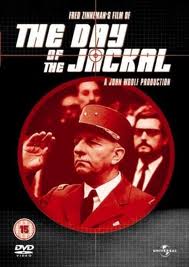
THE DAY OF THE JACKAL
UK, 1973, 142 minutes, Colour.
Edward Fox, Michel Lonsdale, Alan Badel, Eric Porter, Jean Martin, Delphine Seyrig, Olga Georges-Picot?, Timothy West, Tony Britton, Donald Sinden, Anton Rogers, Cyril Cusack.
Directed by Fred Zinnemann.
The Day of the Jackal is a long film that should hold most adult audiences with great interest as it traces preparations for an OAS assassination attempt on De Gaulle in 1963. Director Fred Zinnemann moves the film with meticulous pace: the assassin, his moves, counter-investigation by the French police, by Scotland Yard, decisions by French cabinet, are all interwoven and go forward to the moment of the assassination attempt. The police and intelligence work is fascinating. Much
is presumed about character and motivation especially in Edward Fox's Jackal; Lebel (Michel Lonsdale), the French detective is more intelligible to us. Many reputable English and French actors and actresses have small but telling roles in a distinguished film.
1. The impact of this thriller its reputation as novel and film? The reputation of the director and the cast? The quality of the film?
2. How did it fit into the espionage and political films of the 70s? The focus on politics, crime, assassinations? A 70s look back at the atmosphere of the 60s? Interest and impact now? History, thriller?
3. The importance of the use of European locations to give an air of authenticity to the assassination plot? The picture of France in the early 60's, the O.A.S., the police and the workings of the police, the link between politics and administration of the police?
4. Colour photography, music, editing for pace? The number of French and English reputable actors and their skill and contribution even in minor roles?
5. Audience interest in and involvement via the structure: the presentation of the O.A.S. and the initial assassination attempt? The picture of the O.A.S. and its situation, the plot for the assassination and the development of the plans and the introduction of Claude Lebel and the confrontation between the two? Building to a climax on the day of the jackal and the meeting of the two?
6. The political background of the 60s? General de Gaulle and his administration of France and Algeria? The Algerian war? The O.A.S. and its beliefs? The rights and wrongs of the O.A.S., their fanaticism, the means used? Assassinations, bank robberies etc.? The impact of the initial assassination and the narrative commentary? The officer in charge and his arrest, his believing that he would not be executed, his execution?
7. The portrait of the O.A.S. plotters? Characters, tactics? Their hiding? The hiring of the Jackal and the impact of the interview? Polish assistant and his hearing the name’ of the Jackal? The decision to hide away to avoid implications? A collage of bank robberies? The French police and their investigations, their filming the hideaway in Ronie- of the O.A.S. Rien, the filming of the Polish assistant? The importance of his arrest and the manner of it? The brutality of his torture and interrogation, the transcripts and detecting what he had said, the identification of the word 'jackal'? The rights and wrongs of torture? O.A.S. methods used on O.A.S. men?
8. The background of the O.A.S. with the employment of Denise? Her mission, the way that she arranged to meet the minister, her invitation to his house? Love-making and deceiving him? The way that she got the information? Her phone calls? The comments of the minister during the official meetings and the irony of his giving away the information? The finale with the tapping of his phone, his suicide and Denise's arrest? Illustration of the methods of the O.A.S.?
9. Edward Fox's performance as the Jackal? His skill? Personality? Reputation for other assassinations? A type for assassinations? The interview with the O.A.S. men giving an indication of his mind, the conditions? Money? Being his own man?
10. How well did the film give attention to his plan e.g. his work in the cemetery finding an identity, getting the certificate, forging passports and documents? The work in Genoa with photography, assuming different characters for photographs? The ordering of the rifle and the conditions? The indication of dates and the build-up for the assassination as well as the pressure for the police? The characters of the people in Genoa e.g. the photographer and his death after blackmail, the pride of the gunsmith?
11. The transition of the film to the French Cabinet and the information given after the torture of the Polish assistant? De Gaulle's unwillingness to change any of his plans? The pressure on the minister and on the police? The decision to hire Lebel?
12. The introduction to Lebel at home, with his wife? His quiet attitude, his skill in his work, the way that he organised his office, his assistant? His detailed plans and the invitation to the audience to work with him? The audience's advantage in knowing the Jackal already? The decision about the calls to the various police headquarters? The attention to the meticulous work and detection? His various reports to Cabinet? The irony that this was being leaked to the Jackal? His emphasis on getting a name?
13. Picture of Scotland Yard at work and the contrast with the French? The waking up of the head? Brian Thomas and his mannerisms e.g. picking his teeth, ordinary approach to life? His skill? Contacts in high offices, his being given the task - to avoid the guilt of an Englishman as the Jackal? His working through the files, getting a name, raiding rooms? The contribution too to the detection of the Jackal by Scotland Yard?
14. The build-up of times and days, the nearing of the Jackal to Paris and the nearing of detection? The dramatic effect of this build-up?
15. The final phase and the way that Jackal crossed the border? His staying at the hotel and the interlude with the French woman? The small talk, the lovemaking? The consequences for the woman? His repainting the car, the crash, the taking the car and arriving at her home? The irony of her telling him the truth and her death? The necessity of assuming the identity of the teacher and his skill in doing this and taking the train under the eyes of the police?
16. His skill in eluding the police by going to the Turkish baths and staying with a homosexual? Scotland Yard and the police trying to get his place of living in the hotel? His being seen on the screen and the inevitability of the death of the homosexual?
17. The build-up for security on the day of the ceremonies? The picturing of De Gaulle at the various ceremonies? The audience waiting?
18. The audience's relief when they saw him disguised as the cripple, his getting from the police? His killing the lady in the flats? The build-up to the set-up and the fact that he achieved his goal almost?
19. The dramatic consequences with Lebel and the police going into the flats, the confrontation and the Jackal's death?
20. The significance of the postscript of the funeral, the indication of the mystery, the Englishman returning hora--? The assassin as a fact of the twentieth century?
Published in Movie Reviews
Published in
Movie Reviews
Tagged under
Saturday, 18 September 2021 19:33
Day of the Dolphin, The
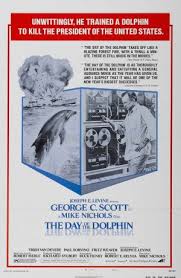
THE DAY OF THE DOLPHIN
US, 1973, 105 minutes, Colour.
George C. Scott, Trish Van Devere, Paul Sorvino.
Directed by Mike Nichols.
The name of director Mike Nichols calls up his four previous films Who's Afraid of Virginia Woolf. The Graduate (for which he received the 1967 Oscar for best direction), Catch 22, and Carnal Knowledge. Buck Henry, the screen writer wrote The Graduate and Catch 22 and had a hand in What's Up, Doc. George C. Scott is generally remembered for Patton and very strong roles. One wonders what Nichols, Henry and Scott are doing associated with the G-rated family thriller, The Day of the Dolphin. At least the critics are asking this, not allowing, perhaps, that everyone is entitled to some relaxation even in their work.
This means that The Day of the Dolphin is entertainment and discussion material for a wide range of audience. It is not a film masterpiece, although the photographs of the dolphins is very beautiful and accompanied by an attractive musical score. Rather, it is well made and light entertainment - with some messages worked into it.
As science-fiction, the film raises questions about dolphins who seem to fascinate mankind with their brains and sound systems. The message seems to be on the pessimistic side. The scientists are good, but idealistic and can be exploited and their work ruined by unscrupulous men.
As a conspiracy-thriller, the film is moderately exciting, with a rather humorously macabre example of poetic justice for the villains. At least, good sins here.
As an animal film, the film should please dolphin lovers, even if they are not convinced by the conversation between George C. Scott and Alpha – ‘Pha loves Pa'! Easy-going entertainment for the average audience.
1. What were your expectations from the title and atmosphere of the film? How do human audiences respond to the presentation of dolphins? What is so attractive about dolphins?
2. Was the story of this film possible? Can dolphins talk? Could they? Have they the anatomical and physiological apparatus to speak? The intelligence?
3. Was this interesting science fiction? What ingredients of science fiction did it use? Was it an interesting political thriller?
4. Comment on the success of the atmosphere at the beginning of the film with Jake Terrell giving his lecture, and the crosscutting to sequences with the dolphin? How was George C. Scott's giving the lecture credible? How did he get sympathy for Terrell and the dolphin? Did this engage audience attention for the whole film?
5. How much of an animal film atmosphere did it have? Especially in the sequences of the dolphin swimming, leaping, talking? The use of photography and music for the swimming of the dolphins - solemnising them in some way?
6. How interesting were the sequences of the training of the dolphins and the scientific explanations of what was happening? How did this engage audience attention? Which sequences best illustrated this?
7. How did the film put the point of view of the humane benefit of science? How was this counterpointed by the ironic use and misuse of humane science? What message was there about the use of science? Was it a pessimistic outlook on how man abuses what is good?
8. Critics called the film a "Boys Own" adventure. Is this true? Were you tricked by the villain? How well did the film indicate Mahoney as the villain - with lighting, sinister music, facial expressions, suspicious behaviour and trick us with the real villain's seeming so pleasant? Did the film utilise the action and the conspiracy well? How was tension generated to the audience?
9. Was the conspiracy plausible? That such a foundation should pool money and resources for a plot? How important was the factor of money in this film? The foundation? The foundation supporting the experimentation? what was the purpose of the plot? Was this well explained?
10. How interesting was the plan of planting the bomb? Was it plausible that the dolphins could do this? Was it made plausible in the film? what did you think of the poetic justice of the conspirators being bombed?
11. Comment on the plausibility of the dolphins warning each other and foiling the plot? Was this well prepared for in the demonstration and what the dolphins did for the fellowship?
12. What were the prospects for all concerned at the end of the film? What future did the Terrell's have? Should they have continued their experimentation with dolphins?
13. For what audience was this film made? What were the intentions of the screen writer and director? How would they have classified the genre of their film? Was this a successful film? An entertaining film? Why?
Published in Movie Reviews
Published in
Movie Reviews
Tagged under
Saturday, 18 September 2021 19:33
Day of the Animals
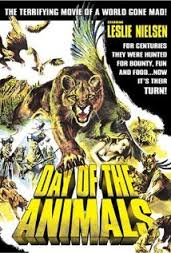
DAY OF THE ANIMALS
US, 1976, 99 minutes, Colour.
Christopher George, Leslie Nielsen, Lynda Day-George?, Richard Jaeckel, Ruth Roman.
Directed by William Girdler.
The Day of the Animals shows how Hollywood's discovery of ecology coincides with the animal menace trend and the Grizzly team have gone back into the forests giving us an "animals wreaking mayhem on humans" warning about polluting the atmosphere? It is quite gripping in its way, illustrating well how the audience's imagination, when confronted by subjective shots, cunning editing and an atmospheric score, supplies most of the fear and terror. But there are plenty of shocks and gory sequences as well. The outdoor forest photography and the animal shots are excellent - only a few studio effects are weak. Predictable characters and emotional conflicts abound. If you don't like scary animal shows, stay with "talkback" programmes for ecology.
1. A good thriller? Indication of the title, expectations and fulfilment? The trend for animal menace and thrillers in the 70s? An original film, derivative?
2. The moralising purpose? The introduction about ozone and aerosols? The warning? The warning by fright? Did it exploit its fright and horror? Could people learn from such a film parable?
3. Colour, music and the atmosphere of fear? Animal photography and location photography and its beauty? The contrast with the studio work, e.g. Mandy's fall and its artificiality, the final storm? An atmosphere of credibility
and reality?
4. The basic situation, the safari, no food or weapons, the holiday atmosphere, exercise? A praiseworthy situation? Why were these people victims of the mutation in nature?
5. The expected group of assorted people, an appropriate cross-section, the variety of attitudes, men and women, young and old? The various types appropriate for this kind of adventure and moral fable?
6. The initial presentation of the eagles, the gradual build-up of the animals, the skill in the photography of the animals, their various looks and poses, the importance of the editing and the suggestion by juxtaposition of images without showing animal savagery? The atmospheric musical combined with the editing and the audience supplying its own fear and terror? An effective thriller by technique?
7. The build-up of the warnings, the explanation of the ozone situation, the move towards evacuation, the radio reports and the group not hearing them properly? The audience knowing all this? Seeing the police, the policeman woken up in the middle of the night and his experience of the rats? As background for the terrors of the safari group?
8. The gradual build-up of suspense and the introduction of animal savagery? The eagle swooping on the boy? The number of birds present and ominously watching? Mandy and her being mauled? The build-up to her death? The terror for her husband and his finding the child? The build-up to the group and the men being attacked by the wolves?
9. The balance of the human interaction and something of its savagery along with the animal interaction? Chris as a personable leader, his skill, control, exercise of leadership? His treatment of the various people? His interest in the reporter and questioning about her approach to life? The professor and his knowledge and enjoyment of the safari? The Indian and his awareness of the forest, his friendship with the boy? The mother and her taking her son on safari, her protectiveness, her wishing she was back in Beverley Hills, her bitching? The young couple, the athlete with cancer, the reporter and her attractiveness? The advertising man and his arrogance, brutality, pride? How inevitable were the clashes? The building up of tensions? Their finding their camps destroyed and no food? Coping with these situations? Night-guarding against the animals and their attacks? Mutual blame? The advertising man and his attack on Chris as leader as a hot-shot etc.?
10. How did the film build up to the decision for the groups to divide? Audience interest in three groups? The background of the evacuation? Mutual intercrossing and building up of tension, the knowledge of what the animals were doing? One group going higher and into danger, the other group going lower?
11. Audience interest in the man and the little girl, their dangers, eventually finding the town, the fright of the snakes, the threat of the dogs, the little girl in the car, the unexpected death of the man by the snakes? Audience identification with this?
12. The group moving towards the helicopter and the growing brutality, the hardships in the rain, the advertising man affected by the ozone, the heat, his brutality and attempted rape? The effect on all of them? His killing the young man, the mother and the son and their fear and the mother's attempting to kill the man? Their escaping finally into the helicopter after the advertising man is crushed by the bear? Why were mother, son and girl saved?
13. The prudent group going down and their surviving on the way down? The cave and the rain? The cabins and the attacks of the dogs and the death of the professor and the athlete? The philosophising between them that had preceded this? The escape onto the raft and survival?
14. Audience relief when the situation passed and safety was for those who survived? The finding of the little girl, of the raft?
15. How valuable this kind of moral ecology fable, warning? Was the film good of its kind?
Published in Movie Reviews
Published in
Movie Reviews
Tagged under
Saturday, 18 September 2021 19:33
Dawn of the Dead
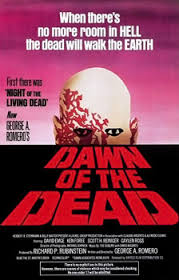
DAWN OF THE DEAD
US, 1979, 139 minutes, Colour.
David Emge, Ken Foree.
Directed by George A. Romero.
Writer-director George Romero made a cult name with his low budget American Vampire classic, Night of the Living Dead (1968). Here, with help on script and music from Italian horror director Dario Argento (Suspiria), a bigger budget and a two-hour running time, he plays with his Living Dead theme (an infected world), survivors at the end of the world (most of the action taking place in a self-sufficient modern shopping mall) and bikie ravagers on the rampage. Nothing new, just Romero doing it - somewhat lazily at times and sometimes not too seriously. Other Romero horror films are The Crazies (1973) and Martin (1976).
1. The writer-director and his reputation? Trading on his reputation? The assistance from Dario Argento for screenplay, horror, shocks, music - from Argento and his group with electronic music?
2. The quality of the horror film as regards content style? The American locations, make-up, special effects, editing? The atmosphere of the score - the electronic music and the Muzak style?
3. Horror films as the equivalent of nightmares - the power to shock, the power to raise up unwanted images? The healthiness of facing nightmares?
4. To what purpose this film? The establishing of a world full of the Living Dead, the end of the world as we know it, Hell being full and the Living Dead wandering the world,, the impact of human chaos, the end of government especially in the United States, the possibilities of home and survival? The significance of the ending with a world of Living Dead and few survivors? The film as an exercise in horrifics? How seriously presented, how much tongue-in-cheek. how much satire?
5. The presentation of the Living Dead - the world presented as full of such creatures, their feeding on living human beings and their blood? The satire on a world full of zombies? The infected world and parasites eating humans? An appropriate apocalyptic image for the end of the world? How well did the film blend these themes?
6. The opening with the chaos at the television station, frantic arguments on and off television, fights? The late transmissions and the end of media communication? The point of opening the film here? The background of politics and trying to cope with the emergencies and crises?
7. The police and their raids, the long detail of the ugly Living Dead? Violence and murder sequences? Death? The killing of the Living Dead? The range of ordinary people showed as Living Dead? The overtones on the violent police films?
8. The impact of the mutants, seeing them feed? The cities full and being transformed into living morgues? The mutants out in the countryside? In the towns and waiting outside the supermarket?
9. The contrast with the living human beings and their attitudes? What constituted their humanity? The escape in the helicopter with its dramatics, the landing and refuelling and the attacks? People living at their wits' ends?
10. The decision to stay in the shopping mall - the mall as a microcosm, the detail of all the shops? How well did the camera communicate all the overtones of modern commercialism by showing advertisements, shops, the goods on sale, the supermarket styles? Money and goods? To what purpose? The zombie Living Dead moving back into familiar grounds - and the irony of people and supermarkets? The surviving group and using their wits to barricade themselves, elude the Living Dead, collect enough food? The style of life and civilisation that they established? The ultimate invasion and corruption of the survivors?
11. The final opting for death or survival - the option for life and escaping?
12. The characterisation of the four in the group - the young policeman and his becoming infected? His love of action - and his wanting to die when corrupted? The fiance and his flying the helicopter, his love for the girl, the pregnancy? His decisions and lack of effort, his finally succumbing? The girl and her pregnancy, a tough professional television woman, her coping with fears, the various dramatic scenes in which she was menaced? The significance of her pregnancy and survival? Peter as the black man, the policeman, friendships? His leadership and various strategies? His option for death and his changing his mind for life?
13. Themes of life and death - and pregnancy within this world?
14. The impact of so much of the film in the supermarket - ordinary life and the parody of it? The importance of the bikie ravagers and their confrontation with the Living Dead? Who was better, worse?
15. The impact of this kind of horror film - experiencing the visuals and the effects rather than an intellectual analysis of themes?
Published in Movie Reviews
Published in
Movie Reviews
Tagged under
Saturday, 18 September 2021 19:33
Dawn at Socorro
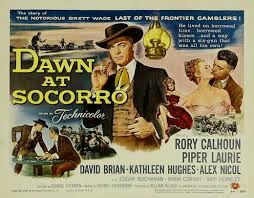
DAWN AT SOCORRO
US, 1954, 80 minutes, Colour.
Rory Calhoun, Piper Laurie, David Brian, Edgar Buchanan, Lee Van Cleef.
Directed by George Sherman.
Dawn at Socorro is one of the many small-budget yet well-made and entertaining westerns from Universal in the '50s. Rory Calhoun and Piper Laurie had appeared in the bright musical Ain't Misbehavin' and were regulars in this kind of film. The material is conventional but is treated well. It has echoes of the Gunfight at the O.K. Corral and the elements of the legends of the West: gamblers reforming, girls being reformed from saloons, villains and shoot-outs. Direction is by George Sherman who made a number of these films over several decades.
1. Entertaining western? The small-budget short-running of the '50s and their impact now? A piece of Americana?
2. Colour photography, the atmosphere of Lordsburg and Socorro? The West? The town? Saloons,'2 The streets? Special effects? The score?
3. The expected conventions of the genre and the way they were used? The night at Lordsburg and the shoot-out? The build-up of vengeance? The wealthy gambler and his control? The reformed gambler and his final shooting? Audience interest? Better done than usual or not?
4. The atmosphere of history and legend? The flashback giving the events some solemnity? The background of this kind of shoot-out in the history of the West? The material of legend and American understanding of their western heritage?
5. Wade as hero? Gambling at Lordsburg, his supporting the law, the wound and the shoot-out and the discovery of his illness, his going to Socorro, his intentions to reform, the encounter with Ronnah? His staying at Socorro for her? The conflict with Braden? The suspense of the poker game? The final shoot-out and the happy ending? A conventional western hero?
6. Ronnah and her father's accusations against her, her going to the saloon, promises of help by Braden? Her not being at home in the saloon? The poker game and the gamble for her? The shoot-out and her decision to go with Wade?
7. Braden and his wealth, gambling, promises to Ronnah, the clash with Wade, the poker game and his winning, his vengeance and the shoot-out?
8. The background of the Ferris family and the shoot-outs in Lordsburg? The Mc Nairs and their trying to keep law and order? The arbitrariness of shoot-outs in the West? Deaths and vengeance? Rapp as the professional gunfighter? His drinking? His vengeance against Wade? His death?
9. The sheriff and his trying to manage the town? The old man and the influence of Braden? Friendship for Wade?
10. The conventional picture of the saloons, the typical people in the West, the law of the gun, the administration of justice? The violent heritage of the American West?
Published in Movie Reviews
Published in
Movie Reviews
Tagged under
Saturday, 18 September 2021 19:33
David Copperfield/ 1970
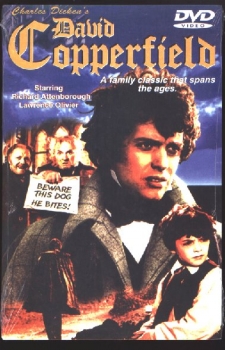
DAVID COPPERFIELD
UK, 1970, 118 Minutes, Colour.
Robin Phillips, Susan Hampshire, Edith Evans, Michael Redgrave, Ralph Richardson, Wendy Hiller, Corin Redgrave, Pamela Franklin, Ron Moody, James Donald, Emlyn Williams, Laurence Olivier, Richard Attenborough, Megs Jenkins, Anna Massey, Cyril Cusack.
Directed by Delbert Mann.
David Copperfield is one of Charles Dickens most popular works. There have been several film versions, the most famous of which was the 30s version directed by George Cukor. W.C. Fields was Mr. Micawber in that version. This particular film was made for the Dickens centenary, a colour version designed for American television but for cinema release throughout the world. However, it is merely a sketchbook of the characters (admittedly with the cream of English actors), and it would be a competent, easy introduction to the book, to Dickens' own life and his version of the world. However, the film's screenplay tends to remain on the surface of things and skims lightly over the characters and the events. It was directed by Delbert Mann who also made a version of Jane Eyre and Kidnapped for the same producers.
1. The audience approach to a classic? Its expectations of a Dickens film? What are they and how were they fulfilled?
2. Is this film a film version of the novel, or an illustration of the novel? The limitations of an illustrated work? The illustrations during the credits sequences?
3. The film was made for television. Is this obvious? The large number of prestige British stars? The episodic nature of the film? Use of colour, locations, close-ups? Did this detract from the overall impact?
4. The importance of the structure of the film: its reference to the novel, the autobiographical form, the role of memory, the tangle of memory and motives, the continual fluidity from present to past? How confusing for the audience? How dramatically telling?
5. The first impressions of David? As an adult, melancholy walks along the beach, looking at the moods of the sea, the music, Agnes coming to meet him? Did this influence the response to the flashbacks?
6. Did the film offer an explanation of what made David the person he was? Was he the hero of his own life? His strengths and weaknesses? What heroism was there in his life?
7. The impact of his father's death and his mother's remarriage? The cruelty of Mr. Murdstone and his sister? Were they caricatures of savagery? His grief and their harshness? The beatings? Murdstone's sending him to work? The harshness of the work? His escaping from the work?
8. David's education and the presentation of 19th century schools? The two eccentric characters in charge of the school? The interviews with David, the meeting with the boys, the punishments, the talks in the refectory, Steerforth and his talk to the head of the school? What effect on David?
9. The importance of Aunt Betsy and Mr. Dick and their influence on David? Aunt Betsy receiving him when he ran away? Her eccentricities? Her reliance on Mr. Dick's advice? Mr. Dick and kindly simplicity with his kite? The importance of their continuing their interest in him when he was at work? Their part in the exposure of Uriah Heep? Aunt Betsy's continuing concern for David and her summoning Agnes at the end? How sympathetic a character was Aunt Betsy?
10. The portrayal of the Wakefields and their status? Business family and prestige? Agnes and her friendship with David? Her love for him and her acceptance of his engagement to Dora? Uriah Heep and his position with the Wakefields? His insinuations, his overdone courtesy, his mock humility? How annoying was he? His ingratiating himself into the family, taking it over, keeping a record of his misdemeanours? How sad were people when he received his humiliation? How cruel was he for instance to Mr. Micawber? The moral of the story about Heep and his downfall?
11. How attractive were the Micawbers? Mr. Micawber and his sense of irresponsibility? Mrs. Micawber and her busyness with the family? Micawber's loyalty to David, his irritation with Heep, his causing Heep's downfall? The migration to Australia?
12. The influence of the Peggottys on David's life? Mrs. Peggotty and her kindness? Peggotty and his interest in David, the anguish about Emily and Steerforth? The kindliness of Barkis and his continued presence there? The importance of the introduction of Steerforth and his attracting Emily away from Ham? The pathos of Emily's downfall? Her being rescued by Peggotty after his search? The irony of Steerforth's death? How well was this subplot developed? How interesting? As a reflection of 19th century manners and morals? The influence on David?
13. David's love for Dora? How genuine? The marriage itself and Dora's inability to manage? David's irritation? The untimeliness of her death and its effect? Aunt Betsy's comment that the marriage would not have lasted?
14. The happy ending for all those who migrated to Australia?
15. David and his having to cope? Purge himself of his memory and guilt? Rely on the support of Agnes?
16. How interesting a picture of 19th century manners, morals, social observation?
17. How well did the film explore the values of an individual, family, education, wealth, love?
Published in Movie Reviews
Published in
Movie Reviews
Tagged under
Saturday, 18 September 2021 19:33
Daughters of Darkness
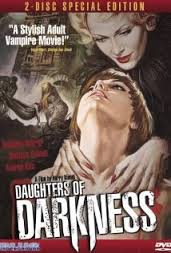
DAUGHTERS OF DARKNESS
Belgium, 1971, 96 minutes. Colour.
Delphine Seyrig, Daniele Ouimet, John Karlen, Andrea Rau, Paul Esser.
Directed by Harry Kumel.
One wonders why vampire stories and films have been so popular in recent years. Continually resurrecting evil, which is continually combated and defeated, serves as an imaginative myth to express something of the mystery of evil - so much destruction, preternatural powers and human heroics. However, many films revel in gore, or go for the ludicrous. This Belgium film is less gory, though it has its moments; it has too much of a perverse lesbian atmosphere. But it has many features of great interest to vampire fans - Delphine Seyrig is the vampire, there are visual echoes and parodies of Last Year at Marienbad and an atmosphere of menace that is well communicated. An unusual horror film.
1. The appeal of horror films, interest in vampire films: fear, fantasies, morbidity?
2. The overall appeal of the vampire myths: themes of immortality, control over other people, sadism. power and death? Sexuality and violence?
3. The female version of vampires with the overtones of violence and sexuality? The kind of woman who is portrayed as a vampire? Insight into this kind of woman?
4. The quality of this film as a Belgium film, its use of Belgian atmosphere?
5. The main star, Delphine Seyrig and the echoes of her performance in 'Last Year at Marienbad'? This being parodied in the presentation of the hotel? The comparison of her vampire with other film vampires? The impact that she made, sinister, violent, sensual, mysterious?
6. How authentic was the atmosphere how credible? The emphasis on blood rather than on fangs and violence? The effect on the audience in terms of fear, identification?
7. The ordinariness of the couple at the beginning, their relationship, marriage and honeymoon? The character of each? Their constant reference to 'mother' and her influence? The fact that they were seduced and became victims? Sympathy?
8. The portrayal of the hotel, the town, the police. the violent atmosphere of murder and mystery?
9. The entrance of the Countess and her appearance, the mystery of the forty years, her stories and fascination of Stefan? The mysterious secretary? The transition to violence and seduction, cruelty and death? The impact of vampires and its mythology, the pros and cons? The irony of Veronica's death and her being transferred?
10. The emphasis on Stefan and his fascination with the Countess' stories, the relationship with the secretary, the self-assertion of masculinity, the death of the secretary? His death?
11. The role of Leona, her seduction of Stefan, the accident of her violent death?
12. The transition to Valerie and her seduction. as a companion to the Countess. as her successor? Especially with the violent death of the Countess?
13. How seriously should films like this be taken? As an example of the genre? As a camp illustration of the genre? Decadence or seriousness? The value of this kind of film?
Published in Movie Reviews
Published in
Movie Reviews
Tagged under